#i JUST got the email
Explore tagged Tumblr posts
Text
POCKET CAMP'S SHUTTING DOWN???
#xenon screams#animal crossing#ac#animal crossing pocket came#acpc#I JUST GOT THE EMAIL#WHAT THE FUCK#one half of the animal crossing games where you can be not white is about to become lost media#AND NEITHER OF THEM ARE GOOD
2 notes
·
View notes
Text
I have an interview on Friday for a legal receptionist job 👀
17 notes
·
View notes
Text

heads up: this games charity bundle was finally approved on itch.io! it opens this friday, april 12th, and will run for a week. all proceeds will go to the Palestinian Children's Relief Fund.
you can check out the bundle on itch.io and follow @vgforpalestine on twitter for more updates!
—
EDIT: as of april 20th, 2024 this bundle is now live!!
#free palestine#itch.io#charity bundle#video games for palestine#palestinian relief bundle#pan talks#just got the email that the project is finally live after a couple tehcnical hiccups and itchio road bumps here and there#they said we could share so i figured i'd post abt it here on tumblr since it appears that they're not on here o7 please boost!#i have a zine in this one but please be sure to check out all of the work
18K notes
·
View notes
Text
GUYS. MISSION TO ZYXX SOUNDTRACK REAL
1 note
·
View note
Text


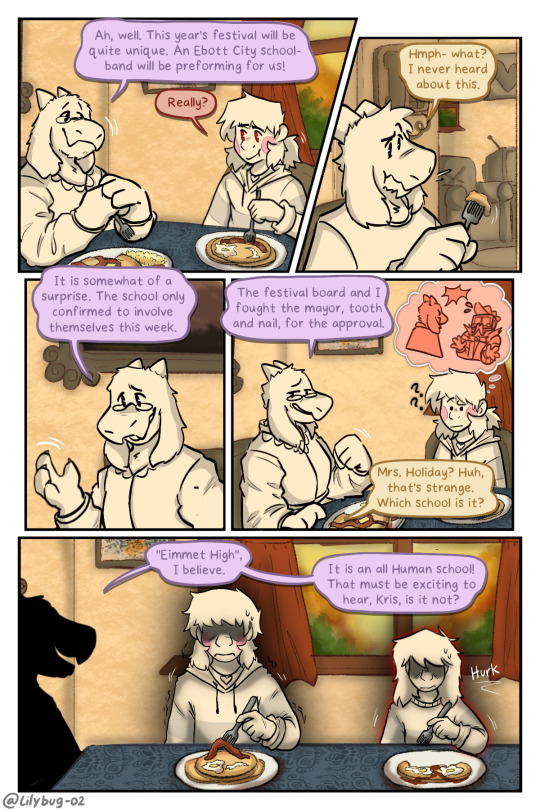

Eimmet High...temmiE high. OMG!
Part 28 || First || Previous || Next
--Full Series--
Next update may take...much longer! I have finals and an internship and not to mention I have to draw- A LOT :')
#Golly!#this is a shorter update but I wanted it to be that way. We've been in the house for a while. It's time to change some scenery!!#Chara using their game narrator voice like “golly!” and “amazing!”#Eimmet high :)) i was really hoping to be able to reference Temmie Chang here. An integral part of UT/DR!! She's awesome!#WE ARE OFFICIALLY ON Day 2 BABY#yes- there is still a little everyman easter egg as well as some other things... ;)#I tried so many new and different things for these panels. I was a little nervous implementing them. But im having a lot of fun with it!#i try to put my own artistic enjoyment above all other things :) its what I strive for.#Angle's landing day! excited for the festivities!#Chara is feeling stabby :)#loved detailing Chara's hand in the last page. When I detail the hands- just know shits getting real#I'm really happy with how I was able to redraw Toriel here. She showed up in the second part and that was it for 2 years -w-#so even if she's not a major character- I wanted to give her some good screen time <3#I did not make the Darkworld ���Mayor” just for that one joke....but dang did it fit perfectly.#these 4 pages took longer than I wanted. I got burnt out with school and then finals came!!! AND ALSO EMAILS q-q#deltarune chara timeline#deltarune chara timeline comic#chara#asriel#kris#susie#toriel#tw cursing#cw cursing
2K notes
·
View notes
Text
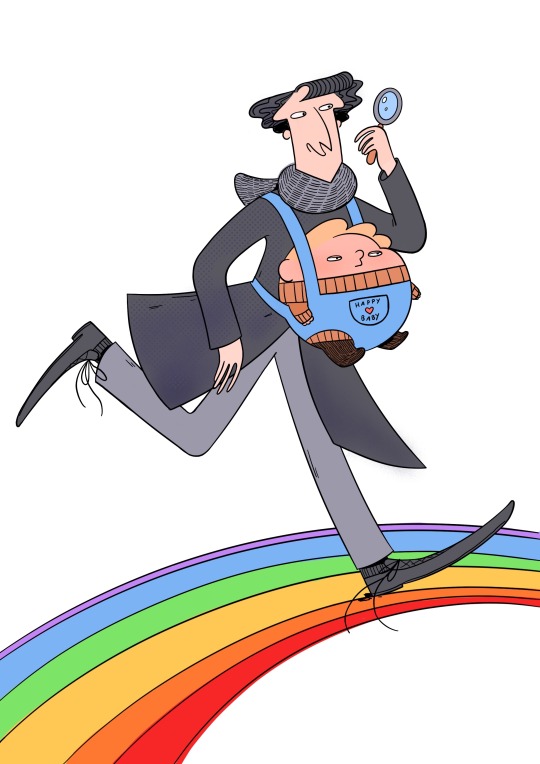
Hey hey hey may 31th anon! How's 2024 going? ☆ヾ(*´▽`)ノ This year I have for you a leaked Sherlock season 5 image. Thinking of you!! And everyone!!
#may 31th anon#Hello hello hello friends!! How are you!!#I miss you all I miss tumblr I miss drawing these silly men#work was soooo boring today I was really happy that I got to draw John in a baby carrier afterwards (*´︶`*)#what have you been up to??#my job is very boring most of the time unfortunatly!! I want to have a new job a little bit but I also never want to have a job interview#ever again and also I might get a lamp this year (!) I have heard that someone has already printed out the lamp form#are you excited for good omens season 3??#I am!! I have also been watching a lot of x-files#(*´▽`*) we also have moths in the kitchen#I do not know what they are eating we have been storing all of our food in the fridge since last week but new moths keep coming#yesterday one flew out of the forks and spoon drawer#it's her kitchen now#I also got a mole removed#now instead of the mole I have a scar the exact same size an color of the mole#I have also been working on a longer comic project!! I think it will be ready to be shared this summer and I really hope you will like it#it's about the old dragon bros characters and their life with the princesses (◍•ᴗ•◍)❤#I'm having a lot of fun drawing again!!#I hope you're having fun too#also I had to write an email today and I had to attach a pdf file but it was upside down#I could not fix it#I just hit send
1K notes
·
View notes
Text

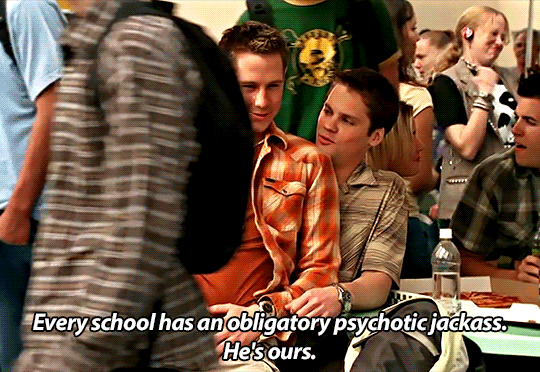

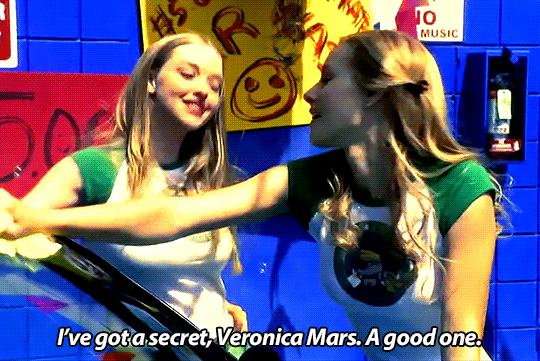

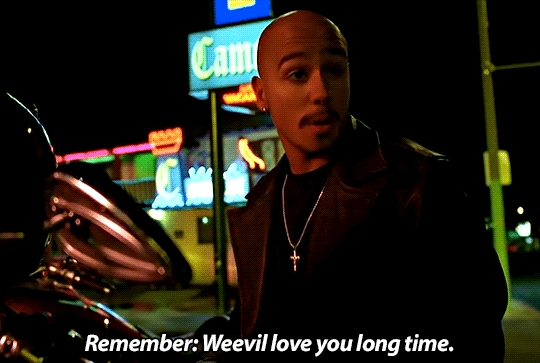

A long time ago, we used to be friends... The Veronica Mars pilot aired 20 years ago today- on the 22nd of September, 2004.
#I got weirdly emotional making this... lil tear in my eye maybe- dont tell anyone#God I just loved this show so much since I was like 10 years old and its been 18 yrs and I rewatched 100 times when I used to make gifs#I mean this blog exists becuase this show compelled me enough to learn how to make gifs- i still have an email from 2012 telling WB#we want a movie to finish the series- i donated to the kickstarter i was there for all the fun that entailed I watched the movie i read#the book- god did I love this series. so nostalgic for me now... I felt so bitter after 2019 it almost made me forget the love i had#to begin with- but making this felt good and this show will always be loved by me so Yuh. Happy 20 yrs and happy 10 yrs to this blog#Veronica mars#vmarsedit#vmedit#vm gifs#veronica mars gifs#kristen bell#wallace fennel#logan echolls#eli weevil navarro#lilly kane#jason dohring#VM#tv show edit#tv show gifs
657 notes
·
View notes
Text

i mean he's got all the outfits now might as well show them off
bonus:

jjk atla!au with @philosophiums
#my art#jujutsu kaisen#jjk#itadori yuuji#yuuji#fanart#jjk fanart#jjk atla!au#atla!au: art#atla!au: illust#lmhs#listen . i would have done cool action poses for all 4 elements i had every intention to do all of them on one page#but there just..... arent any good kicky airbending stances i scoured high and low :((((#2 be fair i mean waterbending ws also tricky to make Leg-centric but i had a vision so i think i made it work :>#but by the time i got to air i got tired ! i gave up ! sue me !#everything is handstands and arm motions smh dont they know i have an Agenda. didnt they read the lore scroll.#im sending a strongly worded email as we speak#plus yuuji doesnt like airbending so when u rly think abt it im doing it for him <3#i think this pose is more in character than him using his airbending in combat#sorry 2 airbender yuuji enjoyers ! i do not like drawing him in the outfit !#the air acolyte robes only look good on toge and yuuta change my mind . u cant i will die on this hill#anyway earth and water r fine buut him firebending looked cooler in the sketch . th outfit looks better from the front but what can u do :/#also i wld like 2 thank those japanese pose catalogues of schoolgirls doing martial arts and Also the cinderace pyro ball swsh animation <3
848 notes
·
View notes
Text

sorry not to randomly come back broke and begging but i do happen to be a lil bit broke and i have sketch comms open again so if anyone would like to grab oneeee
#kae.txt#4 slots#i actually got a email from a place i applied to not too long ago so hopefully i can get a steadier income soon <3#i might open up some headshots for like 40 bucks ive been really into doing those i just dont have good examples to use i think 😭#mycomms#<- to find later maybe
309 notes
·
View notes
Text


















Great's Dying Brain vs Reality : The aftermath of Great and Tyme's first date
4MINUTES (2024) EP. 3 // EP. 6
#4 minutes#4 minutes the series#greattyme#thaidrama#uservix#userrlaura#raeblr#userbon#mjtag#rinblr#esmetracks#userrlana#userpetri#tusersilence#user25shades#asiandramasource#asiandramaedit#fyeahthaidramas#tansgifs#gifs:fourm#wtv you do do not think about the cat plushies not being real#my god great is just so incredibly lonely man#like i don't think his parents are even at the hospital after he got shot#and he thought he found someone in tyme#and while dying he thought what they could have been#anyways i got a way worst gifset than this coming next#gimme a sec i got an evil email to send first
599 notes
·
View notes
Text
my god bbno$ just got invited to riot hq because of the jayvik livestream either they're gonna tap him for jayvik marketing ideas or christian linke himself is gonna take him out back and shoot him
#jayvik#this man's last words to the jayvik groupchat were 'I WILL CANON' my yaoi brother in arms you fight on the front lines for us#something either really good or really bad is gonna happen tomorrow and we probably won't find out about it lmao#because if it's good he'll be under NDA and if it's bad well. he either won't be able or won't want to tell us asfdsgfdhgf#as someone pointed out on twitter if this was a cease and desist they almost certainly would have just emailed that#bringing him all the way to the office?? crossing my fingers it's like. a music collab or an official riot games viktor cosplay request#(hey they did it in brazil and those two were jayviking it up sooooo)#ideally riot was just fucking blown away by the engagement online for this livestream (we're still at 112k posts trending)#and were scrambling to figure out how they can capitalize off of it hopefully seeing the bonkers market for jayvik#the fact that he got this call THE IMMEDIATE DAY AFTER THE LIVESTREAM like holy shit yknow. it's gonna be big#one way or the other#godspeed my man. be careful with him he's a hero#can you feel the winds shifting? in what direction is yet to be seen but. it's like the arcane's waking up yknow
202 notes
·
View notes
Text
hi darlings i hate asking for help but i’m in a pickle this month trying to balance paying rent and prepping for a hurricane, all while going out of town next week. if you could share this i would really appreciate it 😭
i had a check coming in from a publisher that fell through, and now i have to come up with that $500 before next thursday, all while i will be in wyoming. stress
anyway thank you for your time, i appreciate you so much

thank you!! here is da link
#signal boost#i got that email abt the payment and they were like#‘idk it’ll get to you when it gets to you’#and i was like. what if i died actually#anyway#hurricane prep isn’t that expensive it’s mostly just stocking up on groceries and making sure i have batteries and everything#but i just don’t have enough to even. cover rent rn#it’s tough#personal
307 notes
·
View notes
Text
patience being tested. being forced by a bizarre unfortunate situation to adhere to university requirement technicality by taking this simple basic elementary "introduction to environmental history" class.
this class is from facilitators/program which do, like, "history of the American frontier" or "history of fishing and hunting" and still basically subscribe to that old-school twentieth-century idealization and celebration of characters like Teddy Roosevelt and reverence for a mythical arc-of-history-bent-towards-justice narrative of the often-clumsy but ultimately-benevolent US federal government and its mission to "save nature" through the miracle of "sustained yield," while heroic federal land management agencies and "heritage" institutions lead to way, staffed by exceptional individuals (appeals to nostalgia for the frontier and an imagined landscape of the American West; ego-stroking appeals to flattering self-image that center the environmentalist or academic). where they invoke, y'know, ideas like "ecology is important because don't you enjoy cross-country skiing in The Woods with your niece and nephew? don't you like hunting and fishing?" which makes it feel like a time capsule of appeals and discourses from the 1970s. and it invokes concept of "untouched wilderness" (while eliding scale of historical Indigenous environmental relationships and current ongoing colonial violence/extractivism). but just ever-so-slightly updated with a little bit of chic twenty-first-century flair like a superficial land acknowledgement or a reference to "labor histories" or "history from below," which is extra aggravating when the old ideologies/institutions are still in power but they're muddying the water and diluting the language/frameworks (it's been strange, watching words like "multispecies" and "Anthropocene" over the years slowly but surely show-up on the posters, fliers, course descriptions, by now even appearing adjacent to the agri-business and resource extraction feeder programs, like a recuperation or appropriation.) even from a humanities angle, it's still, they're talking at me like "You probably didn't know this, but environmental history is actually pretty entangled with political and social events. In fact, we can synthesize sources and glean environmental info from wacky places like workers' rolls in factories, ship's logs, and poetry from the era." and i'm nodding like YEP.
the first homework assignment is respond to this: "Define and describe 'the Anthropocene'. Do you think 'the Anthropocene' is a useful concept? Why or why not?" Respond in 300 words.
so for fun, right now in class, going to see how fast i can pull up discussion of Anthropocene-as-concept solely from my old posts on this microblogging site.
---
ok, found some
---
I think that the danger in any universal narrative or epoch or principle is exactly that it can itself become a colonizing force. [...] I’m suspicious of the Anthropocene as concept for the very reason that it subsumes so many peoples, nations, histories, geographies, political orders. For that reason, I think ideas like the Anthropocene can be a useful short-hand for a cluster of tangible things going on with the Earth at the moment, but we have to be very careful about how fluid and dynamic ideas become concretized into hegemonic principles in the hands of researchers, policymakers, and politicians. There’s so much diversity in histories and experiences and environmental realities even between relatively linked geographies here in Canada [...]. Imagine what happens when we try to do that on a global scale - and a lot of euro-western Anthropocene, climate change and resilience research risks doing that - eliding local specificities and appropriating knowledge to serve a broader euro-western narrative without attending to the inherent colonial and imperial realities of science and policy processes, or even attending to the ways that colonial capitalist expansion has created these environmental crises to begin with. While we, as a collective humanity, are struggling with the realities of the Anthropocene, it is dangerous to erase the specific histories, power-relations, political orders that created the crisis to begin with. So, I’m glad that a robust critique of the Anthropocene as a concept is emerging.
Text by: Words of Zoe Todd, as interviewed and transcribed by Caroline Picard. “The Future is Elastic (But it Depends): An Interview with Zoe Todd.” 23 August 2016.
---
---
---
The Great Acceleration is the latest in a series of human-driven planetary changes that constitute what a rising chorus of scientists, social scientists, and humanists have labeled the Anthropocene - a new Age of Humans. [...] But what the Anthropocene label masks, and what the litany of graphs documenting the Great Acceleration hide, is a history of racial oppression and violence, along with wealth inequality, that has built and sustained engines of economic growth and consumption over the last four centuries. [...] The plantation, Sidney Mintz long ago observed, was a “synthesis of field and factory,” an agro-industrial system of enterprise [...]. Plantation legacies, along with accompanying strategies of survival and resistance, dwell in the racialized geographies of the United States’ and Brazil’s prison systems. They surface in the inequitable toxic burdens experienced by impoverished communities of color in places like Cancer Alley, an industrial corridor of petrochemical plants running along the Mississippi River from New Orleans to Baton Rouge, where cotton was once king. And they appear in patterns of foreign direct investment and debt servitude that structure many land deals in the Caribbean, Brazil, and sub-Saharan Africa [...]. [C]limatologists and global change scientists from the University of London, propose instead 1610 as a date for the golden spike of the Anthropocene. The date marked a detectable global dip in carbon dioxide concentrations, precipitated, they argue, by the death of nearly 50 million indigenous human inhabitants [...]. The degradation of soils in the tobacco and cotton-growing regions in the American South, or in the sugarcane growing fields of many Caribbean islands, for example, was a consequence of an economic and social system that inflicted violence upon the land and the people enslaved to work it. Such violent histories are not so readily evident in genealogies that date the Anthropocene’s emergence to the Neolithic Revolution 12,000 years ago, the onset of Europe’s industrial revolution circa 1800, or the Trinity nuclear test of 1945. Sugarcane plantations were already prevalent throughout the Mediterranean basin during the late middle ages. But it was during the early modern era, and specifically in the Caribbean, where the intersection of emerging proto-capitalist economic models based on migratory forced labor (first indentured servitude, and later slavery), intensive land usage, globalized commerce, and colonial regimes sustained on the basis of relentless racialized violence, gave rise to the transformative models of plantations that reshaped the lives and livelihoods of human and non-human beings on a planetary scale. [...] We might, following the lead of science studies scholar Donna Haraway and anthropologist Anna Tsing, more aptly designate this era the Plantationocene. [...] It is also an invitation to see, in the words of geographer Laura Pulido, “the Anthropocene as a racial process,” one that has and will continue to produce “racially uneven vulnerability and death." [...] And how have such material transformations sustained global flows of knowledge and capital that continue to reproduce the plantation in enduring ways?
Text by: Sophie Sapp Moore, Monique Allewaert, Pablo F. Gomez, and Gregg Mitman. "Plantation Legacies." Edge Effects. 22 January 2019. Updated 15 May 2021. [Bold emphasis added by me.]
---
---
---
Geologists and other scientists will fight over [the definition of the beginning start-date of the Anthropocene] in scientific language, seeking traces of carbon dioxide that index the worst offenses of European empire which rent and violated the flesh, bodies, and governance structures of Indigenous and other sovereign peoples in the name of gold, lumber, trade, land, and power. [...] The stories we tell about the origins of the Anthropocene implicate how we understand the relations we have with our surrounds. In other words, the naming of the Anthropocene epoch and its start date have implications not just for how we understand the world, but this understanding will have material consequences, consequences that affect body and land.
Text by: Heather Davis and Zoe Todd. On the Importance of a Date, or Decolonizing the Anthropocene. ACME An International Journal for Critical Geographies. December 2017. [Bold emphasis added by me.]
---
---
---
From Aime and Suzanne Cesaire, C. L. R. James, Claudia Jones, Eduoard Glissant, through Sylvia Wynter, Christina Sharpe, and so many others, critical anticolonial and race theory has been written from the specific histories that marked the Black Atlantic. [...] Glissant also reminds us, secondly, of how cunning the absorptive powers of [...] liberal capitalism are - how quickly specific relations are remade as relations-erasing universal abstractions. [...] This absorptive, relations-erasing universalism is especially apparent in some contemporary discourses of […] liberalism and climate collapse - what some call the Anthropocene - especially those that anchor the crisis in a general Human calamity which, as Sylvia Wynter has noted, is merely the name of an overdetermined and specific [White] European man. […] [T]he condition of creating this new common European world was the destruction of a multitude of existing black and brown worlds. The tsunami of colonialism was not seen as affecting humanity, but [...] these specific people. They were specific - what happened to them may have been necessary, regrettable, intentional, accidental - but it is always them. It is only when these ancestral histories became present for some, for those who had long benefitted from the dispossession [...], that suddenly the problem is all of us, as human catastrophe.
Text by: Elizabeth Povinelli. “The Ancestral Present of Oceanic Illusions: Connected and Differentiated in Late Toxic Liberalism.” e-flux Journal Issue #112. October 2020.
---
The narrative arc [of White "liberal humanism"] [...] is often told as a kind of European coming-of-age story. […] The Anthropocene discourse follows the same coming-of-age [...] script, searching for a material origin story that would explain the newly identified trajectory of the Anthropos […]. Sylvia Wynter, W.E.B. DuBois, and Achille Mbembe all showed how that genealogy of [White subjecthood] was [...] articulated through sixteenth- through nineteenth-century [historiographies and discourses] in the context of colonialism, [...] as well as forming the material praxis of their rearrangement (through mining, ecological rearrangements and extractions, and forms of geologic displacements such as plantations, dams, fertilizers, crops, and introduction of “alien” animals). […] As Wynter (2000) commented, “The degradation of concrete humans, that was/is the price of empire, of the kind of [Eurocentric epistemology] that underlies it” (154).
Text by: Kathryn Yusoff. “The Inhumanities.” Annals of the American Association of Geographers, Volume 11, Issue 3. November 2020.
---
---
---
As Yarimar Bonilla suggests in regard to post-Irma-and-Maria Puerto Rico, “vulnerability is not simply a product of natural conditions; it is a political state and a colonial condition.” Many in the Caribbean therefore speak about the coloniality of disaster, and the unnaturalness of these “natural” disasters [...]. Others describe this temporality by shifting [...] toward an idea of the Plantationocene [...]. As Moore and her colleagues write, “Plantation worlds, both past and present, offer a powerful reminder that environmental problems cannot be decoupled from histories of colonialism, capitalism, and racism that have made some human beings more vulnerable [...].” [W]e see that contemporary uneven socioecologies associated with the rise of the industrial world ["the Anthropocene"] are based [...] also on the racialized denial and foreshortening of life for the sacrificial majority of black, brown, and Indigenous people and their relegation to the “sacrifice zones” of extractive industry. [...] [A]ny appropriate response to the contemporary climate emergency must first appreciate its foundations in the past history of the violent, coercive, transatlantic system of plantation slavery; in the present global uneven development, antiblackness, and border regimes that shape human vulnerability [...] that continues to influence who has access to resources, safety, and preferable ecologies [...] and who will be relegated to the “plantation archipelagoes” (as Sylvia Wynter called them) [...].
Text by: Mimi Sheller. “Thinking Beyond Coloniality: Toward Radical Caribbean Futures.” Small Axe (2021), 25 (2 (65)), pages 169-170. Published 1 July 2021. [Bold emphasis added by me.]
---
---
---
Indigenous genocide and removal from land and enslavement are prerequisites for power becoming operationalized in premodernity [...]; it was/is a means to operationalize extraction (therefore race should be considered as foundational rather than as periphery to the production of those structures and of global space). [...] Wynter suggests that we […] consider 1452 as the beginning of the New World, as African slaves are put to work on the first plantations on the Portuguese island of Madeira, initiating the “sugar-slave” complex - a massive replantation of ecologies and forced relocation of people […]. Wynter argues that the invention of the figure of Man in 1492 as the Portuguese [and Spanish] travel to the Americas instigates at the same time “a refiguring of humanness” in the idea of race. [...] The natal moment of the 1800 Industrial Revolution, […] [apparently] locates Anthropocene origination in […] the "new" metabolisms of technology and matter enabled by the combination of fossil fuels, new engines, and the world as market. […] The racialization of epistemologies of life and nonlife is important to note here […]. While [this industrialization in the nineteenth century] […] undoubtedly transformed the atmosphere with […] coal, the creation of another kind of weather had already established its salient forms in the mine and on the plantation. Paying attention to the prehistory of capital and its bodily labor, both within coal cultures and on plantations that literally put “sugar in the bowl” (as Nina Simone sings) […]. The new modes of material accumulation and production in the Industrial Revolution are relational to and dependent on their preproductive forms in slavery […]. In 1833, Parliament finally abolished slavery in the British Caribbean, and the taxpayer payout of £20 million in “compensation” [paid by the government to slave owners for their lost "property"] built the material, geophysical (railways, mines, factories), and imperial infrastructures of Britain and its colonial enterprises and empire. [...] A significant proportion of funds were invested in the railway system connecting London and Birmingham (home of cotton production and […] manufacturing for plantations), Cambridge and Oxford, and Wales and the Midlands (for coal). Insurance companies flourished [...]. The slave-sugar-coal nexus both substantially enriched Britain and made it possible for it to transition into a colonial industrialized power […]. The slave trade […] fashioned the economic conditions (and institutions, such as the insurance and finance industries) for industrialization.
Text by: Kathryn Yusoff. "White Utopia/Black Inferno: Life on a Geologic Spike". e-flux Journal Issue #97. February 2019. [Bold emphasis added by me.]
#sorry for being mean#instructor makes podcasts about cowboys HELP ME#and he recently won a New Business award for his startup magazine covering Democrat party politics in local area HELP#so hes constantly performing this like dance between new hip beerfest winebar coolness and oldfashioned masculinity#but hes in charge of the certificate program so i have to just shut up and keep my head down for approximately one year#his email address is almost identical to mine and invokes enviro history terms but i made mine long before when i was ten years old#so i could log in to fieldherpforum dot com to talk about enviro history of distribution range changes in local reptiles and amphibians#sir if you read my blog then i apologize ive had a long year#and i cant do anything to escape i am disabled i am constantly sick im working fulltime i have NO family i have NO resources#i took all of this schools graduate level enviro history courses and seminars years ago and ran the geography and enviro hist club#but then left in final semester because sudden hospitalization and crippled and disabled which led to homelessness#which means that as far as any profession or school is concerned im nobody im a retail employee#i was doing conference paper revisions while sleeping on concrete vomiting walking around on my cane to find outdoor wifi#and im not kidding the MONTH i got back into a house and was like ok going back to finish the semester the school had#put my whole degree program and department in moratorium from lack of funding#and so required starting some stuff from scratch and now feel like a hostage with debt or worsening health that could pounce any moment#to even get back in current program i was working sixteen hours a day to pay old library fines and had to delicately back out of workplace#where manager was straight up violently physically abusive to her vulnerable employees and threatened retaliation#like an emotional torturer the likes of which i thought existed only in cartoons#and the week i filed for student aid a massive storm had knocked out electricity for days and i was clearing fallen tree debris#and then sitting in the dark in my room between job shifts no music no phone no food with my fingers crossed and i consider it a miracle#sorry dont mean to dramatize or draw attention to myself#so actually im happy you and i are alive
134 notes
·
View notes
Text
it's actually so sad seeing how islamophobia is still so rampant in america. i'm the president of the muslim student association on campus and today a hijabi girl came in and told me about a situation where she was religiously and racially targeted by a PROFESSOR. and the worst part wasn't just the targeting, but it was the fact that she said she was so scared to speak up and tell anyone about it because she was afraid that no one would believe her or do anything about it for her.
we as muslims in america are always told to just put our heads down and take it. it hurts to see how we're told to handle abuse and islamophobia by ourselves and not reach out for help. we're tired of tolerating abuse and hatred for no reason other than pure ignorance. white americans please educate yourselves for the love of god.
#for anyone wondering what happened after she came to me#i told her she needed to report it but she said she was too scared#so i emailed the administration who deal with that stuff and we set up a meeting for all of us to talk about it#i also went home and got in contact with the council of american-islamic representatives#my dad is friends with someone on the council so i talked with him#if the administration on campus doesn't give us satisfactory action then we're making it public#and taking legal action#i hope it doesn't escalate to that tho#i hope that professor just gets fired
212 notes
·
View notes
Text
You know, i've been thinking about the way Batman keeps danger and weapons so close to his body, so tight to himself, practically tied around his neck, that joker often has no way left but to grab for him if he wants something Batman has. Batman does not want to be left out of Joker's plans, his story, he wants in on Joker's narrative by any means he can make it happen. It's such particular "you take me with you wherever you are, it's your punishment, just as it's my punishment to take you with me wherever i am" statement. Batman actively leaves no choice for Joker but to get very very close to him and claim him as part of his win or his loss. I mean,

he didn't have to. he could've put the key in one of his waist pouches, push it into the back of his left boot, he could've tied it around his bicep, i dont care— he could've done whateverthefuck with it. But he had to put it around his neck, and intentionally invite Joker to "come and get it". Something something classic cliche of the way lovers' bond is signified by a necklace-adjacent item and the way they interact with it; hold unto it, toss it, tie it around their necks, giving it back, not giving it back, necklaces as items of reverance and revenge. Something something a tie around neck being a sign of being claimed and owned,
#this is the first night in 2 months where i got good sleep of course i woke up and had batjokes popping on my brain screen#''99+ unread emails'' style#the whole invitation thing is. certainly something#i mean bro. a ''you will take that wish to the grave with you'' would do just fine or#or ''you will not have it.''#Bruce wants his fights alright. He's uneasy with being left out of things often but he's particularly uneasy#with being left out of Joker's narrative#and it's far less about him ''being the only one strong enough to deal with him'' than he'd like to admit#batjokes#batjokes meta#Batman#Batman meta
561 notes
·
View notes
Text
I got an ask that was definitely a scam asking to send me money which like. Let’s be real, I have a bunch of tip and Venmo links, people don’t struggle to find ways to show their appreciation for my antics by sending me money but like.
I’m so curious what the next step of the scam is? I know most scams will be like, “Oh no, I overpaid, please send money back,” and they’ll make a fakey jpg of an invoice showing they sent you money but like.
What could the next possible step be here? They just offered money without a caveat. Does the caveat come later? What happens nexxxxxt.
#ramblies#I just have to know#I used a burner email#it’s got nothing attached but I really wanted to see the next step and I’ll report back if it’s interesting#don’t be me though obviously just block and report scams
123 notes
·
View notes